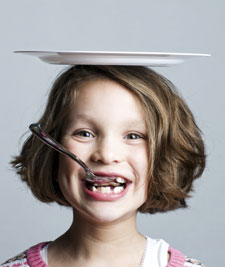
3 Ways to Help Your Child Develop a Healthy Relationship with Food
Now that we’re about to reach our upper-30’s, Mr. P and I are striving to be healthier, to be those people that say, “I feel better at 3 than I did at 25!” In truth, I do feel better than 25-year-old me, probably because I’m not downing cigarette-laced Cosmopolitans every night and eating Del Taco at 2 a.m.
than I did at 25!” In truth, I do feel better than 25-year-old me, probably because I’m not downing cigarette-laced Cosmopolitans every night and eating Del Taco at 2 a.m.
Throughout the process, we’ve made a concerted effort to focus on “healthy eating” as opposed to “dieting” in front of our impressionable little girls. But a couple of weeks ago, my six-year-old grabbed a bag of crackers, read the back of the package, and announced, “These have a lot of calories. If I eat them, I’ll get fat.”
As a mother, that simple statement broke my heart and turned my stomach. I don’t know if she heard it on TV, from a friend at school, or even me, sarcastically explaining to Mr. P why I couldn’t eat that second donut. But immediately I pictured my daughter six years from now, weighing her portions, counting calories or worse, not eating at all.
Setting the foundation for a better eating
While there are numerous sociological, psychological and genetic issues that drive eating disorders, I wanted to make sure we were doing everything in our power to minimize MJ’s risk now and in the future.
“It’s a fine line parents have to walk,” explained Dr. Denise Wilfley, director of the Weight Management & Eating Disorders Program at Washington University and a mother of three young children. “Parents need to promote healthful eating, activity patterns and body image, but not unintentionally become overly concerned to the point that the child becomes rigid about what she can and can’t eat.”
In our society, our kids are at a crossroads. Dr. Wilfley noted that childhood obesity has risen 300% over the past 30 years, and in fact, one-third of children in the U.S. are overweight. On the other hand, eating disorders, like anorexia and bulimia, have increased at an alarming rate among younger children. The Agency for Healthcare Research and Quality, for example, recently reported that hospitalizations for children under age 12 suffering from eating disorders rose 112% between 1999 and 2006.
As parents, it’s more critical than ever to instill a healthy body image in our kids, which is difficult when they’re surrounded by conflicting messages from a two-faced media. Kids are taught that the airbrushed stick-thin models on our TVs are the epitome of beauty while at the same time, they’re urged to gulp down soda and sugared cereal by that same TV.
To help us become better advocates for our children, Dr. Wilfley suggested three things we can do to encourage our kids to make the best decisions when it comes to what they eat.
Redefine how your child thinks of food. So often, food is thought of only as vessels for calories and fat. Instead, parents need to reinforce to kids what good, healthy food is – energy to power their little bodies to achieve incredible things.
Said Dr. Wilfley, “We want to teach kids to view food as fuel – it provides us with the energy we need to do fun things like play sports, be active outside, and do well in school. It’s important to praise kids for who they are and what they can do with their bodies and minds rather than how they look in the mirror. Focusing on inner qualities helps them to learn that they do not need to look a certain way to be accepted or loved.”
For young children my daughter’s age, the message is easy to understand. It empowers them to treat their bodies with respect – to downplay the focus on one’s shape and weight and instead, focus on helping their bodies run properly.
Promote moderation. According to Dr. Wilfley, an all-or-nothing approach to food choices early in one’s life can lead to unhealthy dieting and food restrictions down the road. While this rigidity is most often centered on “forbidden foods” like chocolate or ice cream, it can even cause older children to avoid healthy foods crucial to their overall health.
Dr. Wilfley recommended teaching kids how to budget in treats now and then while ensuring they get adequate nutrition for growth and development. Her suggestion was to employ a stoplight approach – fruits and vegetables are a “green” food; potatoes, breads and pasta are “yellow,” meaning ok in moderation; and foods higher in sugar and fats are “red,” an occasional treat.
Be a model of health. Just as your kid will no doubt curse like a sailor after you accidentally blurt out a swear word, they’ll also mimic how you eat and how you talk about your own body.
“Parents who model healthy behaviors or attitudes toward food and their bodies send a positive message to their children,” remarked Dr. Wilfley. “Decreasing focus on ‘fat/body talk’ and dieting as well as adopting a no-tolerance policy on teasing allow children to thrive in a healthy home environment.”
As someone who has struggled with her body image for 25 years, it’s hard to reprogram my attitude and language when I’m jeans shopping. However, understanding that my attitude affects my daughter’s, I now put on my swimsuit without a self-deprecating comment – at least out loud.
Talking with Dr. Wilfley has made me better prepared for responding to any warning signs I see. When MJ made her calories comment, I explained to her that calories aren’t something she needs to worry about, but instead she should choose foods that are healthy and enjoy a treat every now and then.
Although it was an important lesson for me, her statement turned out to be one of the 10,000 random comments she blurts out during the day. Before I had even finished, she ripped into her crackers and told me dolphins are mammals, relieving my anxiety for one more day.

By Nicole Plegge, Lifestyle Blogger for SmartParenting

Metro East mom Nicole Plegge has written for STL Parent for more than 12 years. Besides working as a freelance writer & public relations specialist, and raising two daughters and a husband, Nicole's greatest achievements are finding her misplaced car keys each day and managing to leave the house in a stain-free shirt. Her biggest regret is never being accepted to the Eastland School for Girls. Follow Nicole on Twitter @STLWriterinIL





















